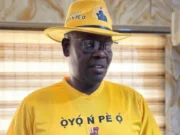The security situation in our dear Oyo state should go beyond passing the buck. Every stakeholder should brace up and team up to jointly address this grave security headache. At this point,there is no point in discussing which agency should play more roles than the others, but agreeably, the governments at all levels need to clear-mindedly take the lead as this is their foremost task. However, with the current political dynamics, each state government is the most concerned, particularly in several parts of southern Nigeria.
In Oyo state, the highly celebrated security network, Amotekun, upon its inauguration, seems to be losing that popularity and people are quickly underrating and ignoring the essence of this agency. And the reasons are not far-fetched, the expectations are too much and many of such expectations are not parts of the mandates and jurisdictions of the agency, coupled with the fact that the agency is further incapacitated to pursue its real tasks by many other factors.
Very importantly, it needs to be emphasized that the agency is not an alternative to the regular police. This is a major point of contention and misunderstanding about the expected roles of the body. This is a mirage and a chief impediment to attaining the goals of setting up this body. The deadlock between the two supposed law-enforcement institutions now aggravates the security situation in the state. Most of the leading gladiators and stakeholders, unexpectedly, are responsible for this worrisome situation.
The nature of recruitments into the agency in the state could understandably be blamed on the precarious situation that led to the emergence of the agency. It was quite shocking when the information filtered that the recruitment process was to be online. This arguably pushed back many authentic local huntersand others with genuine indigenous local security initiatives, particularly those in the rural communities, and triggered iota of suspicions and mistrust towards the intention of the government concerning this body.
The understandably hurried nature of the recruitment could have been responsible for the inability to properly filter, train and educate the successful applicants, hence, the attendant effects become inevitable.
Very importantly, the roles of the agency need to be explicitly stated so that everyone would be well aware of where Amotekuncorps can come in. And such roles must not clash with those of the police, each south-western state governor should ensure that the roles of the agency strictly complement, and not superimpose or rival, those of the police, and facilitate strong relationship between the two agencies without any overt move to favour one to the detriment of the others as has been claimed in some quarters. Following the aftermath of the ENDSARS protest, it is very clear that morale of the police in Oyo state is down, many of the officers are yet to fully resume to duty nine months after the protests, while many others have been transferred on request. The police posts attacked and vandalized during the protest remain in the sorry and dilapidated state and the officers of the command frown on the fact that nearly a year after the terrible event where many of its officers were victims,they are yet to get justice nor appropriate sympathy.
The state government needs to quickly swing into action to salvage the deteriorating relations with the personnel of the command. The government should extend olive branch to the officers, sponsors encouraging media campaigns, support the victim-officers and/or their immediate families, raise funds to support the reconstruction or renovate of the affected police posts. The universal truth is that, no federated state government can win against the police, particularly in a country like Nigeria where the police is centrally controlled. It is baseless for any state government at this point to think it can sideline the police or give a body language that suggests it confers more legitimacy on or prefer some non-state actors or its own agency to the conventional police. Certainly, the cost of mending fence with the police is certainly insignificant compared with the cost of collateral damage arising from insecurity.
The recruitments need to be vetted to ensure that criminal elements do not take advantage of the process just as we are witnessing in various security institutions in the country including the police and the armed forces. We cannot overrule individuals changing after orientations, but there are instances in which some of these corps officials would arrive at scenes where their interventions are required, but upon realizing that those fomenting trouble are their old cliques, the affected officerswould just leave the scene. In fact, in some instances, once certain areas are mentioned, the corps officials might not bother to come having known that the locations are the bases of their former gangs to whom they still hold covert allegiance.
Considering the motive behind constitution of this security network, its effectiveness is not solely dependent on the sophistication of the arms its personnel bear against what is being bandied about in many quarters. This is another albatross of many of the arm-bearing institutions in Nigeria which many of their personnel take unusual pleasure in bearing arms. While they need ‘moderate’ arms, the most important thing at this point is quality training and education. Due to the urgent nature of its constitution, the personnel were only given crash training lasting a few days. This cannot be said to be enough.
Therefore, the government should organize quality security trainings for the corps officials, and this should be followed by routine trainings so as to ensure the personnel stay within their mandate and up the ante. While the services of various legal security institutions and experts are very crucial, it might be necessary to engage some security experts from the foremost reputable developed nations, though within the established legal frameworks. These experts, local, foreign and international, would equip the officials with necessary indigenous, modern as well as up-to-date tactics to confront the insecurity in our communities.
The nature of deployment is another important aspect that requires critical considerations. Mass deployment of the personnel to their own communities might be counterproductive.In a particular local government in Ibadan, there are instances in which the deployed corps officers refuse to act because they are from the location and those fomenting trouble are well-known, many of whom are friends and relatives. Indeed, on most occasions, they would come to the scene, but leave the scene upon realizing that their people are the culprits. Another dimension to this are occasions in which louts threaten to attack the families and residence of the corps officials. Threats like this make the officials to pull back.
Instead of the massive deployment to one’s areas, it is better to deploy only a fraction to such homestead locations and strictly for special fact-finding operations. This set of people might be excluded from the routine operations of the corps, instead they should act as secret (investigative) officers or serve in a special unit. This might yield better results.
On a final note, counting so much on or blaming the federal government for the security issues in Oyo state is more or less a waste of time, as the federal government and its security agencies are clearly underperforming all across the country by all core standards. Each state government should immediately brace up. The government should mend necessary fences and bring various stakeholders together across different divides to address this malaise now that politicking is still hibernating.



































